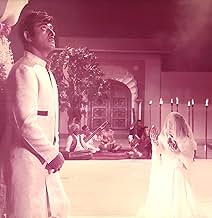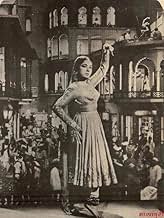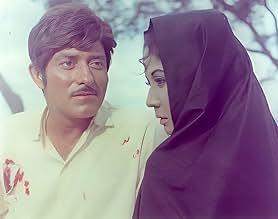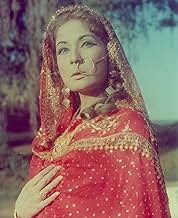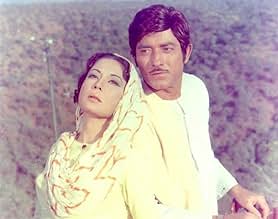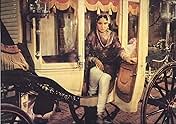IMDb रेटिंग
7.2/10
1.9 हज़ार
आपकी रेटिंग
एक वेश्या साहिबजान को सलीम अहमद खान से प्यार हो जाता है. वे भाग जाने का फ़ैसला लेते है लेकिन उसे हर कोई पहचान जाता है जिसके कारण उसे मजबूरण वेश्यालय लौटना पड़ता है.एक वेश्या साहिबजान को सलीम अहमद खान से प्यार हो जाता है. वे भाग जाने का फ़ैसला लेते है लेकिन उसे हर कोई पहचान जाता है जिसके कारण उसे मजबूरण वेश्यालय लौटना पड़ता है.एक वेश्या साहिबजान को सलीम अहमद खान से प्यार हो जाता है. वे भाग जाने का फ़ैसला लेते है लेकिन उसे हर कोई पहचान जाता है जिसके कारण उसे मजबूरण वेश्यालय लौटना पड़ता है.
- पुरस्कार
- 1 जीत और कुल 4 नामांकन
D.K. Sapru
- Hakim Saab
- (as Sapru)
फ़ीचर्ड समीक्षाएं
10RajB
Without question, this film has to be one of the greatest ........ in cinematic history. I have it watched too many times to remember, and each time it is like I am seeing the film for the first time.
Where does one begin?
Meena Kumari's central performance is undoubtedly one of the finest of her career, followed closely by Sahib Bibi aur Ghulam and Phool aur Pathar. Each movement and nuance of her performance, makes any other Bollywood heroine pale into significance. Her masterly interpretation of Kathak coupled with her grace, tragic vulnerability and poetic delivery of Urdhu, is like nothing ever seen on the bollywood screen.
Pakeezah is perhaps the most stylised interpretation of the human condition; the photography, sumptuous cinematography and mise en scene, are so charged with symbolism and meaning, that the viewer is left breathless.
Naushads music, is unsurpassed, his knowledge of the music of the courtesan gharanas is incredible, and the way in which he punctuates the narrative with dark atmospheric motifs and overwhelming romantic melodies is indeed remarkable.
My only advice to anyone who seriously enjoys the spectacle of total cinema, should watch this epic mediation on life and art.
Where does one begin?
Meena Kumari's central performance is undoubtedly one of the finest of her career, followed closely by Sahib Bibi aur Ghulam and Phool aur Pathar. Each movement and nuance of her performance, makes any other Bollywood heroine pale into significance. Her masterly interpretation of Kathak coupled with her grace, tragic vulnerability and poetic delivery of Urdhu, is like nothing ever seen on the bollywood screen.
Pakeezah is perhaps the most stylised interpretation of the human condition; the photography, sumptuous cinematography and mise en scene, are so charged with symbolism and meaning, that the viewer is left breathless.
Naushads music, is unsurpassed, his knowledge of the music of the courtesan gharanas is incredible, and the way in which he punctuates the narrative with dark atmospheric motifs and overwhelming romantic melodies is indeed remarkable.
My only advice to anyone who seriously enjoys the spectacle of total cinema, should watch this epic mediation on life and art.
Pakeezah has a very interesting history (which is well documented in the 'Trivia' section) about how it came to be. It seems as if destiny conspired to test Kamal Amrohi (the director) while at the same time secretly desiring to see him complete his masterpiece.
Pakeezah rides on metaphors, poetry and visual elocution. As a result the intensity with which emotions come out achieve a dimension which may not be very real but are very effective and leave an impact on the viewer.
Meena Kumari lives the tragedy of Nargis and Sahib Jaan like her own. The other stars of the film, besides her, are Ghulam Mohammed (the music director), Lata Mangeshkar, Naushad (background score) and Joseph Wirsching (the d.o.p). Their music and cinematography leaves you spell bound.
Pakeezah is a classic in world cinema. It reveals new layers to you every time you watch it again. Kamal Amrohi is one of the rare poets of cinema and he left us all a gift.
Pakeezah rides on metaphors, poetry and visual elocution. As a result the intensity with which emotions come out achieve a dimension which may not be very real but are very effective and leave an impact on the viewer.
Meena Kumari lives the tragedy of Nargis and Sahib Jaan like her own. The other stars of the film, besides her, are Ghulam Mohammed (the music director), Lata Mangeshkar, Naushad (background score) and Joseph Wirsching (the d.o.p). Their music and cinematography leaves you spell bound.
Pakeezah is a classic in world cinema. It reveals new layers to you every time you watch it again. Kamal Amrohi is one of the rare poets of cinema and he left us all a gift.
10lance-20
Perhaps the most polished and accomplished of all Indian films - Pakeezah does not fall into any of the traps commonly associated with Bollywood film (ie tackiness, farce, wholesale and unsuccessful imitation of western film themes/genres). Pakeezah is indigenous to the Sub-Continent and authentic, almost Madam Butterfly-like in plot. Characters are well-developed, direction, although sometimes unrefined by today's standards, perceptive and convincing. The Urdu-speaking milieux at the time of Pakeezah were masters of understatement and how the dialogue conveys the subtleties of the age! The acting (particularly the 'looks' and the dynamic between characters) are a delight to behold although the nuances may be lost on contemporary viewers or those not acquainted with the mores and customs of Muslim India.
Coupled, with a captivating screenplay is a beautiful musical score, enhanced by the protagonist displaying eminent command of classical Indian dance (kathak). As is the case with most romantic tragedies, the heroine must die, but she does not take her leave of the audience without the viewer feeling he/she has been party to a truly memorable cinema experience. Pakeezah is surely the pinnacle of what Indian cinema has produced and is unlikely to be paralleled.
Coupled, with a captivating screenplay is a beautiful musical score, enhanced by the protagonist displaying eminent command of classical Indian dance (kathak). As is the case with most romantic tragedies, the heroine must die, but she does not take her leave of the audience without the viewer feeling he/she has been party to a truly memorable cinema experience. Pakeezah is surely the pinnacle of what Indian cinema has produced and is unlikely to be paralleled.
Pakeezah Was Directed By Kamal Amrohi...Who Was Known For His Perfectionism....It Was Produced & Written Again By Him... Screenplay Is Fine With The Script...
Story is About Sahibjaan Who Was Brought Up By Brothel Madame Nawabjaan.... She Grows Up & Becomes Popular Dancer/Singer.... Forest Ranger Salim is Enthralled By Her Beauty & Innocence, Convinces Her To Elope With Him But Trials And Tribulations Await As She is Recognized By Men Wherever She Goes With Salim.... When He Renames Her Pakeezah (Pure) Takes Her To A Priest To Be Legally Married, She Refuses, Returns To The Brothel..The Story Moves Further...
Meena Kumari As Sahibjaan Is Best Part Of The Movie....She Is Brilliant With Acting & Dancing...Raj Kumar As Salim Is Fine ...He Is Good In Few Of The Scenes....Veena As Nawabjaan Does Well..
Music Is Composed By Ghulam Mohammad & Naushad....Ghulam Mohammad Died During The Making Of The Movie So Naushad Was In...It Has Some Classic Dance Numbers Like "Chalte Chalte" By Lata,"Inhi Logon Ne" By Lata,"Thare Rahiyo" By Lata.....
Overall A Great Movie...It Took 14 Years To Complete The Movie...Many Changes Took Place During The Making But Final Output Was Brilliant ...The Film, Which Had Been Declared A Flop When First Released, Became A Success....Today Considered A Classic...Must Watch :)
Story is About Sahibjaan Who Was Brought Up By Brothel Madame Nawabjaan.... She Grows Up & Becomes Popular Dancer/Singer.... Forest Ranger Salim is Enthralled By Her Beauty & Innocence, Convinces Her To Elope With Him But Trials And Tribulations Await As She is Recognized By Men Wherever She Goes With Salim.... When He Renames Her Pakeezah (Pure) Takes Her To A Priest To Be Legally Married, She Refuses, Returns To The Brothel..The Story Moves Further...
Meena Kumari As Sahibjaan Is Best Part Of The Movie....She Is Brilliant With Acting & Dancing...Raj Kumar As Salim Is Fine ...He Is Good In Few Of The Scenes....Veena As Nawabjaan Does Well..
Music Is Composed By Ghulam Mohammad & Naushad....Ghulam Mohammad Died During The Making Of The Movie So Naushad Was In...It Has Some Classic Dance Numbers Like "Chalte Chalte" By Lata,"Inhi Logon Ne" By Lata,"Thare Rahiyo" By Lata.....
Overall A Great Movie...It Took 14 Years To Complete The Movie...Many Changes Took Place During The Making But Final Output Was Brilliant ...The Film, Which Had Been Declared A Flop When First Released, Became A Success....Today Considered A Classic...Must Watch :)
At last - I've finally got round to it and managed to see a "clean" copy of Pakeezah! Up until now I've only had a mangled scratchy jerky version taped off Dubai TV sometime in the '90's, with quirky English subtitles, dizzying widescreen coverage and a fluid colour with a mind of its own. Having thought the world of such a poor (and short) copy I find the decent one was well worth the wait and the full 140 minutes even more of a pleasure than I thought possible.
This was the lovely Meena Kumari's film from start to finish, and I believe was planned by her from 1958 on, finally realising it in 1971. What a shame it was that chronic alcoholism finally killed her soon afterwards, and in fact that she was too ill to perform in some of the scenes in Pakeezah, necessitating a body double. In some scenes the strain definitely shows in her face.
The story of Purity versus Adversity I can only treat as fiction having no experience of anything remotely close to it, but I'm led to understand that it faithfully depicts a world now gone that must have been common at one time in India. It's a sparkling and colourful film with a simple relentless epic message, an intense romantic tragedy which is somehow simultaneously feelgood too. But to me it's the peerless golden music by Ghulam Mohammed as sung by the incomparable Lata Mangeshkar - especially Thare Rahiyo - and its part in the unfolding of the story that makes this film so outstanding. I've seldom heard such serious, beautiful, poetic, wondrously sung and played songs on any movie soundtrack. Singin' In The Rain may be my favourite musical film but Pakeezah has my favourite music - yet Lata said that the songs themselves meant nothing special to her. The only pity is that the also unique Mohammed Rafi only had the one song in here, albeit a classic duet with Lata.
Because of all this but not blind to its faults, Pakeezah is my favourite Indian movie, filmed at a time when the Westernisation of India was gathering pace and watched now when Western values seem to be state sponsored and de rigueur. At the very least watch Pakeezah for a taste of what Indian "pop" music had to offer the world before it was all jettisoned for drum machines, the Bollywood Beat and bhangra.
This was the lovely Meena Kumari's film from start to finish, and I believe was planned by her from 1958 on, finally realising it in 1971. What a shame it was that chronic alcoholism finally killed her soon afterwards, and in fact that she was too ill to perform in some of the scenes in Pakeezah, necessitating a body double. In some scenes the strain definitely shows in her face.
The story of Purity versus Adversity I can only treat as fiction having no experience of anything remotely close to it, but I'm led to understand that it faithfully depicts a world now gone that must have been common at one time in India. It's a sparkling and colourful film with a simple relentless epic message, an intense romantic tragedy which is somehow simultaneously feelgood too. But to me it's the peerless golden music by Ghulam Mohammed as sung by the incomparable Lata Mangeshkar - especially Thare Rahiyo - and its part in the unfolding of the story that makes this film so outstanding. I've seldom heard such serious, beautiful, poetic, wondrously sung and played songs on any movie soundtrack. Singin' In The Rain may be my favourite musical film but Pakeezah has my favourite music - yet Lata said that the songs themselves meant nothing special to her. The only pity is that the also unique Mohammed Rafi only had the one song in here, albeit a classic duet with Lata.
Because of all this but not blind to its faults, Pakeezah is my favourite Indian movie, filmed at a time when the Westernisation of India was gathering pace and watched now when Western values seem to be state sponsored and de rigueur. At the very least watch Pakeezah for a taste of what Indian "pop" music had to offer the world before it was all jettisoned for drum machines, the Bollywood Beat and bhangra.
क्या आपको पता है
- ट्रिवियाIt took 14 years for this film to be completed. To begin with, the film was launched in 1958, jointly planned by Kamal Amrohi and 'Meena Kumari'. It was launched in black-and-white, but when colour came in vogue, Amrohi scrapped those portions already shot and decided to start again. Later, Cinemascope came into vogue, and Amrohi acquired a Cinemascope lens from MGM and scrapped the plain colour portions too. Then Amrohi and Kumari separated in 1964, bringing filming to an indefinite halt. Finally, the film was resumed in 1968, and though by then Kumari was suffering from alcoholism and was in critical condition, she was still Amrohi's only choice and she agreed to complete the film.
- भाव
Salim Ahmed Khan: [in a note to Sahibjaan] Aapke paon dekhe, bahut haseen hai. / Inhe zameen par mat utariyega, maile ho jayenge.
[Saw your feet; they are very beautiful. / Don't place them on the ground, they will get dirty]
- कनेक्शनFeatured in Ek Number Ka Chor (1990)
टॉप पसंद
रेटिंग देने के लिए साइन-इन करें और वैयक्तिकृत सुझावों के लिए वॉचलिस्ट करें
- How long is Pakeezah?Alexa द्वारा संचालित
विवरण
- चलने की अवधि
- 2 घं 27 मि(147 min)
- पक्ष अनुपात
- 2.35 : 1
इस पेज में योगदान दें
किसी बदलाव का सुझाव दें या अनुपलब्ध कॉन्टेंट जोड़ें

